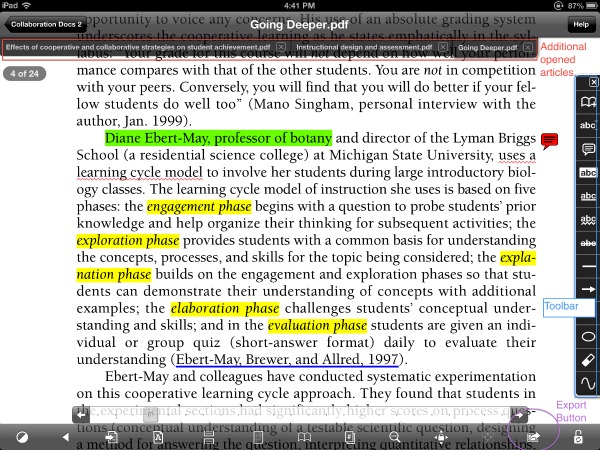Adapt Courseware, the provider of comprehensive adaptive online curriculum resources that individualize each student’s learning experience, has released new social learning tools as part of its courseware offerings. The tools promote increased online collaboration among students and with instructors. The goal of Adapt Courseware’s approach to community-based learning is to deliver a more engaging educational experience where each student can benefit from a high level of support and interaction.
Read more ›CURRENT ARTICLE • February 01
OTHER RECENT ARTICLES
You have to admire scholars willing to look at 40 years of research on any topic, and this particular review is useful to faculty interested in understanding the role of humor in education. It starts with definitions, functions, and theories of humor. It identifies a wide range of different types of humor. It reviews empirical findings, including the all-important question of whether using humor helps students learn. And finally, this 30-page review concludes with concrete advice and suggestions for future research. It’s one of those articles that belong in even modest instructional libraries—imagine having to track down the better-than-100 references in the bibliography.
Read More ›Capstone courses are now a requirement in many departments, programs, and college curricula. They vary across different dimensions, indicating that although their value is universally recognized, they share few common features. For starters, they are offered at various levels; at the department level for students in a particular major, at the college level, say, for students in engineering, and at the university level as a general education integrative experience.
Read More ›Students benefit from taking and having a good set of notes, even though many of them don’t see the value, don’t take good notes, and like it best when they can copy word-for-word what the teacher says or has on the PowerPoint slides. We can pontificate about how students should have already been taught the value and skills of note taking. We can tell them in class, on the syllabus and the course website that they need to take notes, but I think less telling and more showing is the better way to go. This post offers a range of activities teachers can use to help students discover what a good set of notes enables them to do.
Read More ›Heidi Beezley, instructional technologist at Georgia Perimeter College, strives to instill online courses with active learning, “providing opportunities for students to meaningfully talk and listen, write, read, and reflect on the content, ideas, issues, and concerns of an academic subject” (as defined by Meyers and Jones). To this she adds: “interact[ing] with realia, manipulatives, simulations, etc.”
Read More › It’s the first day of class. They shuffle in, spot similar life-forms, and slip in with that group. Hipsters sporting wild hair and tats, buttoned-up and serious young scholars, middle-aged moms and dads, maybe a couple of aging hippies. One or two sad souls choose spots isolated from the others; they don’t want to identify with them for reasons of insecurity, arrogance, or something else.
It’s the first day of class. They shuffle in, spot similar life-forms, and slip in with that group. Hipsters sporting wild hair and tats, buttoned-up and serious young scholars, middle-aged moms and dads, maybe a couple of aging hippies. One or two sad souls choose spots isolated from the others; they don’t want to identify with them for reasons of insecurity, arrogance, or something else.
In preparing for my own dissertation research, I began getting electronic copies of journal articles so that I would not be burdened with lots of paper copies and for better file organization. I also did not want to read the copies while sitting at my computer but to use my iPad instead. While reading any journal article there is a need to markup the copy with personal notes, highlights, underlines, and other helpful markings so I needed a program that would allow me to do that on my mobile device.
Read More ›Abreena Tompkins, instruction specialist at Surry Community College, has developed a brain-based online course design model based on a meta-analysis of more than 300 articles. In this study, she distilled the following elements of brain-based course design:
Read More ›I’m working my way through a 33-page review of scholarship on instructional change in Science, Technology, Engineering and Math (STEM) disciplines. The authors reviewed an impressive 191 conceptual and empirical journal articles. However, what they found isn’t impressive both in terms of the quality of the scholarship on this topic and in terms of instructional change in general.
Read More ›Online homework has great appeal for instructors, especially those teaching large courses. By using online assignments, instructors don’t have to collect, grade, and promptly return large quantities of homework assignments. Online programs provide instructors with feedback on student performance that can be used to modify the presentation of material in class. Online homework is also beneficial to students. They get feedback promptly, even more promptly than that provided by very conscientious instructors. Online homework can also be designed so that it allows students to work on areas that frequently cause trouble and/or on areas where the individual student is having difficulty.
Read More ›





